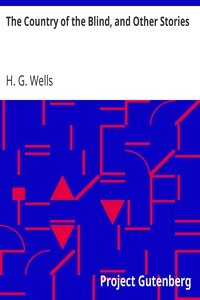The Country of the Blind, and Other Stories, H. G. Wells [top 10 books of all time TXT] 📗

- Author: H. G. Wells
Book online «The Country of the Blind, and Other Stories, H. G. Wells [top 10 books of all time TXT] 📗». Author H. G. Wells
About midday he came at last out of the throat of the gorge into the plain and the sunlight. He was stiff and weary; he sat down in the shadow of a rock, filled up his flask with water from a spring and drank it down, and remained for a time resting before he went on to the houses.
They were very strange to his eyes, and indeed the whole aspect of that valley became, as he regarded it, queerer and more unfamiliar. The greater part of its surface was lush green meadow, starred with many beautiful flowers, irrigated with extraordinary care, and bearing evidence of systematic cropping piece by piece. High up and ringing the valley about was a wall, and what appeared to be a circumferential water-channel, from which the little trickles of water that fed the meadow plants came, and on the higher slopes above this flocks of llamas cropped the scanty herbage. Sheds, apparently shelters or feeding-places for the llamas, stood against the boundary wall here and there. The irrigation streams ran together into a main channel down the centre of the valley, and this was enclosed on either side by a wall breast high. This gave a singularly urban quality to this secluded place, a quality that was greatly enhanced by the fact that a number of paths paved with black and white stones, and each with a curious little kerb at the side, ran hither and thither in an orderly manner. The houses of the central village were quite unlike the casual and higgledy-piggledy agglomeration of the mountain villages he knew; they stood in a continuous row on either side of a central street of astonishing cleanness; here and there their particoloured facade was pierced by a door, and not a solitary window broke their even frontage. They were particoloured with extraordinary irregularity, smeared with a sort of plaster that was sometimes grey, sometimes drab, sometimes slate-coloured or dark brown; and it was the sight of this wild plastering first brought the word "blind" into the thoughts of the explorer. "The good man who did that," he thought, "must have been as blind as a bat."
He descended a steep place, and so came to the wall and channel that ran about the valley, near where the latter spouted out its surplus contents into the deeps of the gorge in a thin and wavering thread of cascade. He could now see a number of men and women resting on piled heaps of grass, as if taking a siesta, in the remoter part of the meadow, and nearer the village a number of recumbent children, and then nearer at hand three men carrying pails on yokes along a little path that ran from the encircling wall towards the houses. These latter were clad in garments of llama cloth and boots and belts of leather, and they wore caps of cloth with back and ear flaps. They followed one another in single file, walking slowly and yawning as they walked, like men who have been up all night. There was something so reassuringly prosperous and respectable in their bearing that after a moment's hesitation Nunez stood forward as conspicuously as possible upon his rock, and gave vent to a mighty shout that echoed round the valley.
The three men stopped, and moved their heads as though they were looking about them. They turned their faces this way and that, and Nunez gesticulated with freedom. But they did not appear to see him for all his gestures, and after a time, directing themselves towards the mountains far away to the right, they shouted as if in answer. Nunez bawled again, and then once more, and as he gestured ineffectually the word "blind" came up to the top of his thoughts. "The fools must be blind," he said.
When at last, after much shouting and wrath, Nunez crossed the stream by a little bridge, came through a gate in the wall, and approached them, he was sure that they were blind. He was sure that this was the Country of the Blind of which the legends told. Conviction had sprung upon him, and a sense of great and rather enviable adventure. The three stood side by side, not looking at him, but with their ears directed towards him, judging him by his unfamiliar steps. They stood close together like men a little afraid, and he could see their eyelids closed and sunken, as though the very balls beneath had shrunk away. There was an expression near awe on their faces.
"A man," one said, in hardly recognisable Spanish—"a man it is—a man or a spirit—coming down from the rocks."
But Nunez advanced with the confident steps of a youth who enters upon life. All the old stories of the lost valley and the Country of the Blind had come back to his mind, and through his thoughts ran this old proverb, as if it were a refrain—
"In the Country of the Blind the One-eyed Man is King."
"In the Country of the Blind the One-eyed Man is King."
And very civilly he gave them greeting. He talked to them and used his eyes.
"Where does he come from, brother Pedro?" asked one.
"Down out of the rocks."
"Over the mountains I come," said Nunez, "out of the country beyond there—where men can see. From near Bogota, where there are a hundred thousands of people, and where the city passes out of sight."
"Sight?" muttered Pedro. "Sight?"
"He comes," said the second blind man, "out of the rocks."
The cloth of their coats Nunez saw was curiously fashioned, each with a different sort of stitching.
They startled him by a simultaneous movement towards him, each with a hand outstretched. He stepped back from the advance of these spread fingers.
"Come hither," said the third blind man, following his motion and clutching him neatly.
And they held Nunez and felt him over, saying no word further until they had done so.
"Carefully," he cried, with a finger in his eye, and found they thought that organ, with its fluttering lids, a queer thing in him. They went over





Comments (0)